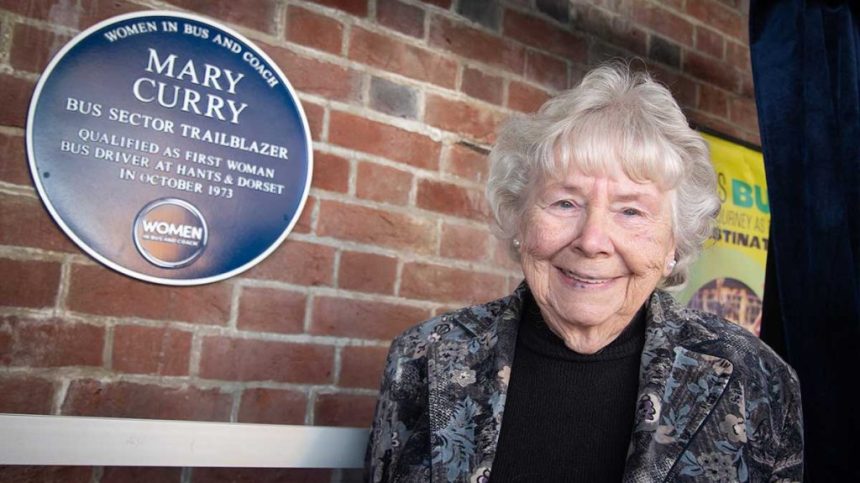Since its launch in 2023, the Women in Bus and Coach (WiBC) blue plaque initiative has been quietly but powerfully reshaping how we recognise the contributions of women in the coach, bus and community transport industries. For too long, the sector’s history has celebrated male milestones while overlooking the many women who broke new ground behind the wheel, in depots, and across operations. The blue plaque initiative is setting that record straight, one story at a time.
These plaques are far more than commemorative signs. They are permanent, public celebrations of trailblazing women whose achievements have helped shape the industry we know today.
Located at meaningful sites, each plaque invites us to reflect, learn and be inspired. To date, three remarkable women have been honoured:
The first blue plaque, unveiled in 2023 at Winchester Bus Station, recognises Mary Curry. In 1973, Mary made history as one of the first two women to qualify as a professional bus driver for Hants and Dorset. At a time when driving a bus was still considered a ‘man’s job’, Mary’s determination and professionalism helped pave the way for others, setting a precedent that women could — and should — have equal opportunities in front-line transport roles.
The second recipient, Jill Viner, was London’s first woman bus driver. Jill began driving for London Transport (now Transport for London) in 1974 and quickly became a symbol of progress. Her service not only marked a turning point in recruitment but also made her a role model for women across the capital. She is now commemorated with two blue plaques: One at Cromwell Road Bus Station in Kingston, and another at the London Transport Museum in Covent Garden — both launched with high profile events, and both recognising her lasting impact on the industry and women’s representation within it.
The third blue plaque, unveiled as part of the WiBC Northern Region launch by Mayor of West Yorkshire Tracy Brabin, celebrates Maxine Duffus, who made history in 1983 as Yorkshire’s first black woman bus driver. Maxine’s resilience and trailblazing spirit helped break both gender and racial barriers at a time when the industry — and society — was far less inclusive. Her legacy continues to inspire colleagues and communities today, and her plaque proudly marks a life of service, advocacy, and quiet revolution.
Each plaque does more than honour an individual; it tells a story of determination, courage, and progress. It also challenges us to reflect on whose stories we still haven’t heard — and whose contributions deserve recognition next.
That’s why WiBC is calling on the industry to get involved.
Do you know a woman — past or present — whose role in the coach, bus or community transport sector deserves permanent recognition? Whether she worked in driving, engineering, management, training or operations, we want to hear her story. Nominations are open for future blue plaque recipients across the UK.
Let’s continue to celebrate the women who moved our industry forward — often against the odds — and ensure their legacy is preserved for generations to come.
You can nominate someone here.
Together, we can make sure her story is proudly remembered, not quietly forgotten.



























